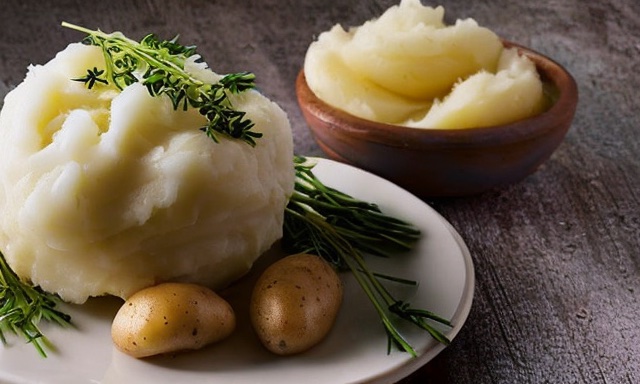Internet Asks: “Carbs in Mashed Potatoes”
Indulging in a warm, velvety mound of mashed potatoes is a delight that transcends boundaries. But for those keeping an eye on their carbohydrate intake, the carb content of this beloved side dish can be a cause for concern. Fear not, fellow spud enthusiasts! In this article, we'll delve into the world of carbs in mashed potatoes, uncovering the secrets of this creamy culinary creation while keeping the fun intact. So, grab your fork and get ready for a tasty and informative adventure!
sponsored links

The Carb Chronicles of Mashed Potatoes
Mashed potatoes are made from, well, potatoes! And as you may have guessed, potatoes contain carbohydrates. Carbohydrates are the primary source of energy for our bodies, and potatoes are a starchy vegetable rich in this macronutrient. However, the carb content can vary depending on factors like potato type, cooking method, and added ingredients. So, let's explore the carb landscape of mashed potatoes and find a balance that suits your dietary needs.
The Role of Starch
Potatoes are naturally rich in starch, which is a complex carbohydrate made up of long chains of glucose molecules. Starch plays a crucial role in giving mashed potatoes their smooth and creamy texture. When potatoes are cooked, the starches undergo a process called gelatinization, where they absorb water and swell, resulting in that luscious consistency we all love.
Decoding the Carb Content
The carb content of mashed potatoes can vary depending on factors such as the type of potato used and the preparation method. On average, a one-cup serving of mashed potatoes contains around 35-40 grams of carbohydrates. However, keep in mind that this value can change depending on additional ingredients like butter, milk, or cream. If you're monitoring your carb intake, it's essential to factor in these additions when calculating your overall carb consumption.
The Carb Trade-Off
While mashed potatoes may contain carbs, they also bring several nutritional benefits to the table. Potatoes are a good source of vitamins, minerals, and dietary fiber. They provide essential nutrients like vitamin C, potassium, and B vitamins, contributing to overall health and well-being. Opting for whole potatoes or incorporating healthier preparation methods, such as using low-fat milk or olive oil instead of butter, can help strike a balance between enjoying mashed potatoes and managing carb intake.
sponsored links
Managing Carb Intake
If you're watching your carb intake, there are several strategies to enjoy mashed potatoes without going overboard. Here are a few tips to keep in mind:
- Portion Control: Moderation is key. Be mindful of your portion size and enjoy mashed potatoes as part of a well-balanced meal.
- Choose Wiser Potatoes: Different potato varieties have varying starch content. Opting for lower-starch potatoes like red or new potatoes can result in mashed potatoes with a lower carb content.
- Lighten Up: Traditional mashed potatoes often contain butter, cream, or whole milk, which can contribute to the overall carb count. Consider using lower-fat dairy options or even non-dairy alternatives to reduce the carb load while still maintaining a creamy consistency.
- Pair It Right: Pairing your mashed potatoes with protein-rich foods or fiber-packed vegetables can help balance out your meal and slow down the digestion of carbs, promoting better blood sugar control.
Fun with Carb-Smart Mashed Potatoes Recipes
With a little creativity, you can enjoy this comforting dish while keeping an eye on your carb intake. Here are some fun and flavorful ideas for carb-smart mashed potatoes:
- Cauliflower Mash: Swap some or all of the potatoes with steamed cauliflower for a lower-carb alternative. Blend them together with herbs and spices for a delicious and nutritious twist.
- Sweet Potato Mash: Embrace the vibrant and slightly sweet flavor of sweet potatoes. These nutritious tubers offer a lower glycemic index than regular potatoes, making them a great option for those watching their carb levels.
- Greek Yogurt Infusion: Instead of using heavy cream or butter, try adding a dollop of tangy Greek yogurt to your mashed potatoes. It adds creaminess and a hint of acidity while reducing the overall fat content.
- Herbaceous Delight: Elevate your mashed potatoes with the addition of fresh herbs like chives, parsley, or dill. They bring a burst of flavor and make your dish feel extra special, all while keeping the carb count in check.
Conclusion
Carbs in mashed potatoes add to the satisfying and comforting experience of this beloved dish. By understanding the carb content and making mindful choices, you can strike a balance between enjoying mashed potatoes and managing your overall carb intake. So, embrace the creamy goodness, get creative with healthier variations, and savor the delightful flavors of mashed potatoes, knowing that you're in control of your carblicious journey.
sponsored links
References
- USDA. Potatoes, flesh and skin, raw. https://fdc.nal.usda.gov/fdc-app.html#/food-details/170026/nutrients
- Cleveland Clinic. Carbohydrates. https://my.clevelandclinic.org/health/articles/15416-carbohydrates
- USDA. Potatoes, mashed, ready-to-eat. https://fdc.nal.usda.gov/fdc-app.html#/food-details/169768/nutrients
- Bon Appetite. Best Potatoes for Mashing. https://www.bonappetit.com/story/best-potatoes-for-mashing
- WebMD. Health Benefits of Potatoes. https://www.webmd.com/diet/health-benefits-potatoes
- BBC Good Food. Perfect Mashed Potatoes Recipe. https://www.bbcgoodfood.com/recipes/creamy-mash
People are also reading...
Does Sprite Have Caffeine?
Calories In Steak?
Chicken Taco Calories?
Does Hot Chocolate Have Caffeine?
Are Carrots Acidic?
Are Mangoes Acidic?
Orange Juice pH?
Does Kahlua Have Caffeine?
Calories In a Grilled Cheese?
Is Watermelon Acidic?
6 oz Steak Calories?
Are Strawberries Acidic?
Ready to level-up?
Create meal plans 10x faster, follow up with your clients through our mobile app, and never struggle with meal planning or recipe management again.